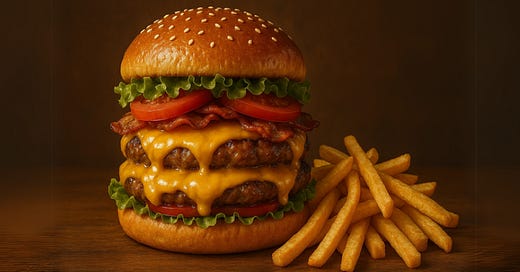Understanding Supernormal Stimuli & the Erosion of Satisfaction
When the Chase Becomes the Habit
What Are Supernormal Stimuli?
Back in the 20th century, Nikolaas Tinbergen noticed something peculiar when he placed giant, bright-blue plaster eggs beside a bird’s real ones and the bird sat on the fakes, ignoring her own. Well, they were bigger, rounder, and more intensely coloured. In other words, they looked like an upgrade.
He saw this pattern again and again. Moths flying straight into electric lights. Fish attacking plastic toys. These creatures weren’t malfunctioning. They were responding, just as nature intended, to cues that felt more rewarding than the real thing.
Tinbergen called them supernormal stimuli.
Does it sound familiar?
A crisp that’s engineered to crunch in the most satisfying way. A phone notification coloured red to catch your attention. A video platform that auto-plays the next clip so your brain doesn’t get a chance to say “enough.” These things speak to our ancient drives : our need for nourishment, for social approval, and yes, for stimulation; but stretch them past the point of balance.
These days, supernormal stimuli are intentionally seducing. They mimic something meaningful, then exaggerate it just enough to bypass reflection. And when everything around us becomes louder, brighter, tastier, faster, it’s no wonder we lose track of the line between craving and needing.
The Psychological Consequences
When a person can’t find a deep sense of meaning, they distract themselves with pleasure.
— Viktor E. Frankl
When our environment is flooded with stimuli designed to feel better than reality, something starts to shift. We get used to the noise. What once felt exciting becomes normal, and what’s normal starts to feel dull. The bar keeps rising, and our capacity to feel satisfied falls.
In my opinion, this is one of the cruellest tricks of overstimulation. It makes the real world, the ordinary, the slow, the quiet, feel underwhelming. Not because it is, of course, but because we’ve trained our brain to expect more. More colour, more flavour, more speed.
This is when a conversation with a friend might feel flat compared to the rush of notifications and followers on a social platform. Or an unfiltered photo seems lifeless next to something polished and enhanced.
The issue is that over time, this does more than nudge us toward distraction. It changes how we feel inside. Restlessness becomes the background hum. Our attention frays. We feel low but can’t name why. Have you noticed how the modern mind is often saturated, yet undernourished? It is exposed to constant stimulation while missing the deeper signals that bring calm, clarity or joy.
Anticipation & Consummation
Also, have you noticed how the idea of something can feel more exciting than the thing itself?
This is because the brain comes alive not so much during the reward, but just before it. That moment of anticipation, when anything could happen, often carries more weight than the outcome itself.
Goodwin and colleagues confirm this in their study [2].
They found that people are more driven by the expectation of pleasure than its actual experience, especially when it comes to exaggerated, high-reward stimuli like junk food, social media, online shopping, or television (In the study, these were directly compared with natural alternatives like fresh fruit, in-person conversations, reading a book, or having a home-cooked meal).
Anticipation is a truly powerful force. It is the search, the pursuit. It keeps us going and hoping that the next thing or next time will be it. But the moment of consummation: the actual bite, the act, the finding, often lands with less impact than expected. It passes quickly.
It surely might leave a trace, but rarely enduring satisfaction. Indeed, Goodwin’s study suggests that we often return to these exaggerated rewards not out of lasting enjoyment, but because we’ve been conditioned to crave them.
See, supernormal stimuli stretch out the build-up and keep gratification just out of reach. And even when the experience itself does not quite deliver, we rarely slow down. In fact, we go back for more.
We learn to favour the thrill of wanting over the feeling of having.
Reclaiming Our Mind
There’s nothing wrong with wanting or pursuing things. After all, the mind is built to seek, to reach, to explore. But when daily living is full of exaggerated signals, it can become harder to tell the difference between what we truly enjoy and what we’ve simply been trained to crave.
Note that reclaiming our way of being isn’t about cutting ourselves off from (modern) life. It’s about turning back to it intentionally and deliberately. In a world overtaken by supernormal stimuli, the chase becomes our default mode. Have you noticed how we’ve gotten used to reaching for the next thing before the present one has even settled? Over time, this craving becomes less about the object itself and more about the movement.
Pursuit becomes a habit.
But there is another way to relate to life. One that isn’t built around intensity. One that isn’t shaped by engineered highs. It begins with noticing the kinds of experiences that don’t shout for our attention, but still hold it. Reading a book with presence, or listening to someone speak without waiting to reply. The kind of activities that build satisfaction without urgency.
Relearning Fulfilment
So, how can we restore our responsiveness and sensitivity to natural cues after it has been flattened?
This is not not just about the return of feeling, but of discernment, the ability to recognise what fulfils us. This means learning to be gratified by what is ordinary, to find satisfaction in what unfolds subtly, without demands. A return to a state where smaller things feel like enough and stillness is not mistaken for emptiness.
Of course, this shift doesn’t happen all at once. This is a process. But each time we pause, each time we resist the pull to reach for something brighter, faster, or tastier we begin to reclaim something essential: the ability to respond on our own terms.
This is how we slowly learn to cultivate a life that feels satisfying, not just stimulating.
Reference List:
[1] Berridge, K. C., & Robinson, T. E. (2016). Liking, wanting, and the incentive-sensitization theory of addiction. American Psychologist, 71(8), 670–679. https://doi.org/10.1037/amp0000059
[2] Goodwin, B. C., Browne, M., & Rockloff, M. (2015). Measuring preference for supernormal over natural rewards: A two-dimensional anticipatory pleasure scale. Evolutionary Psychology, 13(4), 1–11. https://doi.org/10.1177/1474704915613914
[3] Tinbergen, N. (1951). The Study of Instinct. Oxford University Press.
If you’re new here, welcome! I post a new article every Wednesday at 4.30 pm (UK time) & share notes every day. I’m really glad you’re here :)








Another fascinating insight. Shiny object syndrome, the faded excitement from my latest post, this touches upon many things that I have realised about myself recently. It's like drug resistance or is it tolerance? When you need more to feel the same effect, but with everything the bigger more colourful eggs, the more pixels on a screen. The "This goes to 11" mindset.
Just this weekend, I thought it would be a good idea to order pizza, then after 3 slices wondered, "Who's idea was this?" the thought of it was better than the actual pizza. I didn't have to cook though so 🤷
You hit the nail straight. I have been struggling with exact situation as you described. I have been chasing one stimuli after another, always with a Hope that it will give me satisfaction for sure. But I always end up finding myself fully present in the moment during the consumption, but empty once it's over, chasing after another stimuli, or finding myself disappointed and again chasing after another stimuli with a new hope.
Sometimes the thing is a video, movie, series, anime, manga, food...
I know it's not good for me but I still end up doing it.
Not being able to commit myself to something, not being able to stay patient to pay attention to something that is not too intense, not being able to focus...
As, I write I can't ever muster up the patience to review my comment, and correct the grammatical mistakes, and inconsistencies.
I don't know when i'll able to stay focuses, and stay calm without any intense stimuli like I Used to be
Thank you for writing this.
I came across you through the note you shared. It turns out you write genuine, and helpful content.
I am subscribing you.
I'll follow your advice of satisfaction even in mundane.